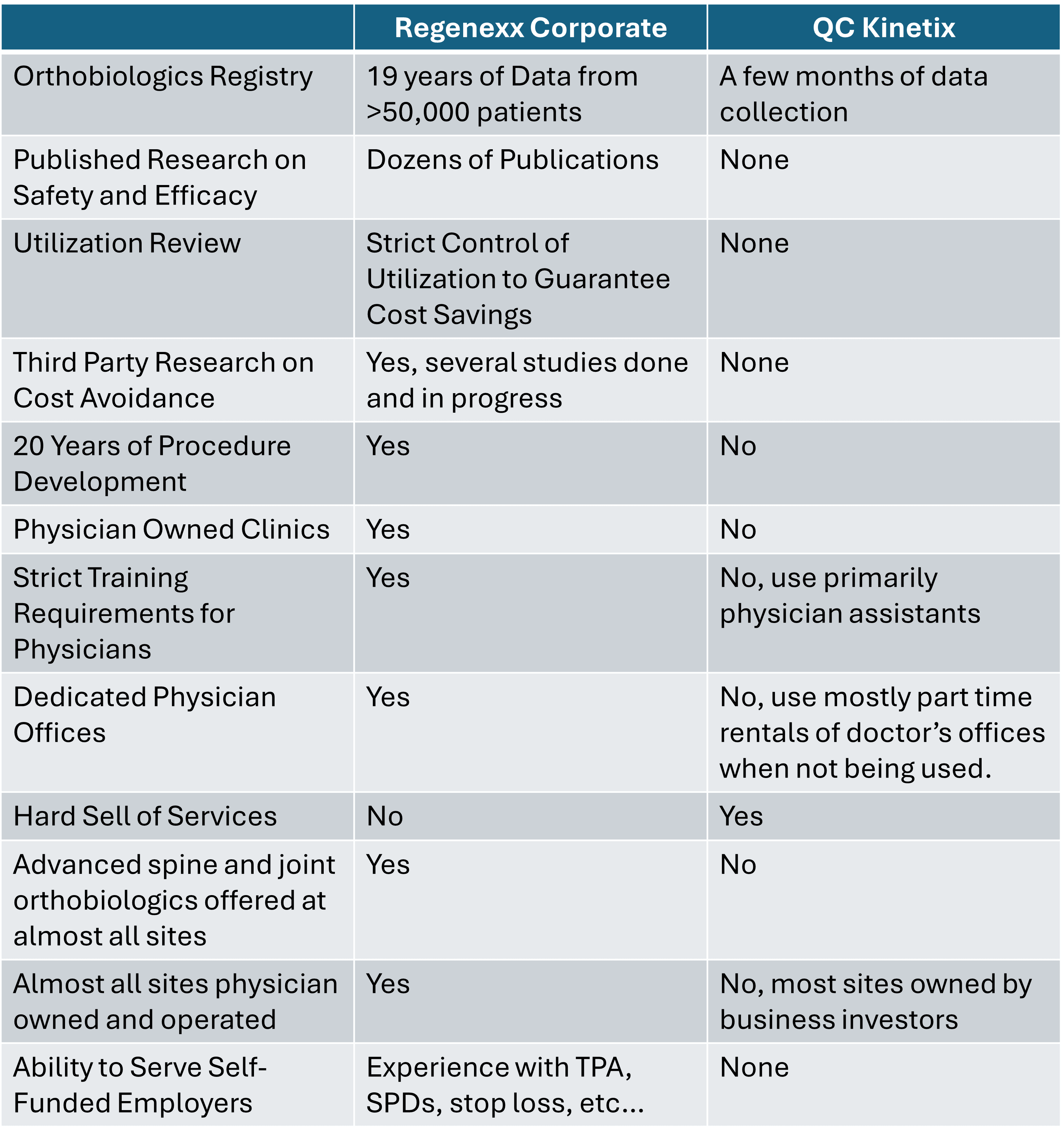QC Kinetix Goes from Mastering the Upsell to Reducing Costs?

I have often written about QC Kinetix because they’re hard to miss. They have bombarded the airwaves across the US, causing countless physician colleagues to reach out and ask, “What the heck is this?” Now I hear that the company has decided to create a program to save corporations money on their elective orthopedic surgery spend. So, let’s jump in and see what’s up.
What is QC Kinetix?
QC Kinetix is a group that uses mid-levels (i.e., not physicians) to deliver orthobiologic injections and sets up shop in doctor’s offices when they are not being used. Most of their clinics are investor-owned rather than physician-owned. They get people in the door through aggressive radio advertising and then use aggressive sales techniques to “upsell” the patient and get them into the most expensive regen med option they often can’t afford. To close the deal, they often use “buy today for a discount” sales pressure with financing. Finally, they often hire “medical directors” who rarely visit the clinic. Do you think I used the term “aggressive” too aggressively above? That was purposeful as IMHO there is no other way to describe this operation.
Maybe I’m making all of this up? Mitch Sheinkop, the company’s new medical director, confirmed most of it in an interview. Other issues that Dr. Sheinkop mentioned were the severe drop in quality between the corporate-owned clinics (only 6 of them) and the franchise clinics (almost 200 of them). I have also had a QC insider reach out to me personally and he or she confirmed that everything I have written about this company was accurate.
As you might imagine, all of this has legit physicians involved in working hard to help patients with orthobiologics concerned. Why? They spend tens of thousands of dollars each year learning the latest and greatest techniques at conferences and spend many hours honing their skills only to see a mid-level PA with feeble supervision and far fewer skills claim that they can offer the same services. They are appalled by the upsell at these clinics and the sky-high bills for lesser quality care. They know all this because the smart patients leave the QC Kinetix hard sell and eventually wander into their clinics.
The Class Action Suit
Because of what IMHO is a classic oversell and underdeliver operation, QC Kinetix has an active class action suit against the company. From the lawsuit:
“The complaint claims that during the women’s appointment later that month, “QC Franchise Group did not take any images, include [sic] x-rays, MRI’s or CAT Scans, nor did it review any of Plaintiff’s prior medical records regarding the cause of her pain.” The plaintiff also claims that she did not see a medical doctor at any point at QC Kinetix – Champaign.
According to the case, the woman was then subjected to a “high-pressure sales presentation” pushing her to get injections in both hips and both shoulders, even though the plaintiff was not having pain on both sides and her pain originated from nerves in the lower back. The plaintiff says she was eventually convinced to agree to undergo five treatment sessions that would cost a total of $20,000.”
“Per the complaint, the plaintiff agreed to pay for the treatment with a $20,000 loan serviced by defendants Security First Bank and Med-Den Funding, LLC, which does business as Proceed Finance. The case claims that the loan documents the plaintiff received contained a notice representing that any loan cancellations must be initiated through the medical provider and that it would be up to the medical provider to decide whether any refund would be made or claims honored.”
The QC Kinetix Corporate Program
If you read this blog, you know I often write about what I experience daily. This week, a colleague sent a presentation showing that QC Kinetix is trying to sell a corporate program. This means they suggest that companies use QC Kinetix sites to save money. I have to say that I laughed a bit, as, IMHO, that’s like putting a gambling addict in charge of your checking account. Everything that QC Kinetix has shown the medical world to date goes contrary to the idea that it could ever hold a credible fiduciary position with an employer. Let’s dive into what we do at Regenexx to better understand how silly this is.
The Regenexx Corporate Program

The Regenexx Corporate program is now 2,200 employers strong. All indications are that the number of covered lives in that program will double over the next 12 months. So what is it?
Regenexx Corporate signs contracts with medium- and large-sized employers with self-funded health plans. That means these companies pay the bills for employee medical care rather than going through a third-party insurer like most small companies. This makes sense, as why would you let an insurance company make money off of premiums if you didn’t have to? Since these companies are self-funded, they have tremendous control over what they cover.
Regenexx Corporate then refers patients to our 100+ US sites when the employee is considering surgery. A real doctor (not a PA) in a real full time medical clinic run by doctors, then decides whether a Regenexx image-guided orthobiologic injection procedure would save the employee downtime and the employer money. Regenexx has a strict utilization review over this whole process, meaning if, based on our almost two decades of collected data, that procedure won’t save the employer money; the procedure isn’t covered under the program. If approved, that employee can have their orthobiologic procedure paid through their health plan. In our experience, allowing free rien on orthobiologics in a health plan is a prescription that costs the employer more money than surgery, not less.
In addition, knowing which procedure in which clinical setting will be effective and which procedure will likely fail is critical. The only way that Regenexx knows that is through the two decades of registry data we have collected and dozens of peer-reviewed publications. QC Kinetix would have no way of knowing which end is up in this department.
Let’s take an example. A patient with moderate to severe hip arthritis goes to a Regenexx clinic to try to avoid surgery. Since our registry data shows a low chance of success for this procedure, even if we use bone marrow concentrate containing stem cells, the Regenexx corporate program won’t approve this procedure. That information on the high failure rate for more severe hip arthritis comes from almost two decades of data collection across thousands of patients and a published case series (1). On the other hand, the same patient with moderate to severe knee arthritis is a candidate because the outcomes are better in that clinical scenario. That data comes from our registry, thousands of patients over almost two decades, several published case series, and a randomized controlled trial (2-6). In addition, a QALY cost analysis. Does QC Kinetix have any of this data collected, analyzed, or published? Nope.
I have included a table above to compare and contrast Regenexx corporate and QC Kinetix.
The upshot? IMHO, I think it’s hilarious that a company that has aggressively been selling people treatments they don’t need and often can’t afford is now claiming to be able to save anybody money. I would be surprised if QC is still in business in 24 months, let alone a player in delivering orthopedic cost savings to employers.
____________________________________________
References:
(1) Centeno C et al. Efficacy and Safety of Bone Marrow Concentrate for Osteoarthritis of the Hip; Treatment Registry Results for 196 Patients. Journal of Stem Cell Research and Therapy. 2014, 4:10
(2) Centeno CJ, Berger DR, Money BT, Dodson E, Urbanek CW, Steinmetz NJ. Percutaneous autologous bone marrow concentrate for knee osteoarthritis: patient-reported outcomes and progenitor cell content. Int Orthop. 2022 Oct;46(10):2219-2228. doi: 10.1007/s00264-022-05524-9. Epub 2022 Aug 6. PMID: 35932306; PMCID: PMC9492580.
(3) Centeno CJ, Money BT, Dodson E, Stemper I, Steinmetz NJ. The rate of venous thromboembolism after knee bone marrow concentrate procedures: should we anticoagulate? Int Orthop. 2022 Oct;46(10):2213-2218. doi: 10.1007/s00264-022-05500-3. Epub 2022 Jul 18. PMID: 35844014; PMCID: PMC9492566.
(4) Centeno C, Cartier C, Stemper I, Dodson E, Freeman M, Azuike U, Williams C, Hyzy M, Silva O, Steinmetz N. The Treatment of Bone Marrow Lesions Associated with Advanced Knee Osteoarthritis: Comparing Intraosseous and Intraarticular Injections with Bone Marrow Concentrate and Platelet Products. Pain Physician. 2021 May;24(3):E279-E288. PMID: 33988949.
(5) Centeno CJ, Al-Sayegh H, Freeman MD, Smith J, Murrell WD, Bubnov R. A multi-center analysis of adverse events among two thousand, three hundred and seventy two adult patients undergoing adult autologous stem cell therapy for orthopaedic conditions. Int Orthop. 2016 Aug;40(8):1755-1765. doi: 10.1007/s00264-016-3162-y. Epub 2016 Mar 30. Erratum in: Int Orthop. 2018 Jan;42(1):223. doi: 10.1007/s00264-017-3680-2. PMID: 27026621.
(6) Centeno C, Pitts J, Al-Sayegh H, Freeman M. Efficacy of autologous bone marrow concentrate for knee osteoarthritis with and without adipose graft. Biomed Res Int. 2014;2014:370621. doi: 10.1155/2014/370621. Epub 2014 Sep 7. PMID: 25276781; PMCID: PMC4170694.

NOTE: This blog post provides general information to help the reader better understand regenerative medicine, musculoskeletal health, and related subjects. All content provided in this blog, website, or any linked materials, including text, graphics, images, patient profiles, outcomes, and information, are not intended and should not be considered or used as a substitute for medical advice, diagnosis, or treatment. Please always consult with a professional and certified healthcare provider to discuss if a treatment is right for you.
